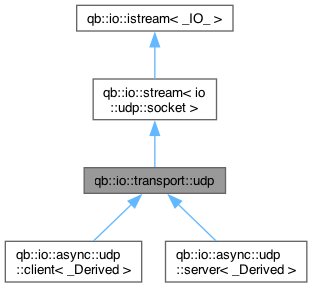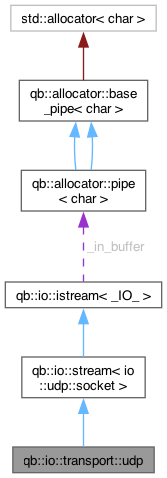|
qb
2.0.0.0
C++17 Actor Framework
|
|
qb
2.0.0.0
C++17 Actor Framework
|
UDP transport providing connectionless, datagram-based communication. More...
#include <udp.h>


Classes | |
| struct | identity |
| Identifies a UDP endpoint, extending qb::io::endpoint with hashing support. More... | |
| class | ProxyOut |
| Proxy class providing a stream-like interface for sending UDP datagrams. More... | |
Public Member Functions | |
| constexpr bool | is_secure () const noexcept |
| Indicates that this transport implementation is not secure. | |
| const udp::identity & | getSource () const noexcept |
| Get the source udp::identity (endpoint) of the last successfully received datagram. | |
| void | setDestination (udp::identity const &to) noexcept |
| Set the destination udp::identity for subsequent outgoing datagrams sent via out() or operator<<. | |
| auto & | out () |
| Get the output proxy (ProxyOut) for stream-like sending to the current destination. | |
| int | read () noexcept |
| Read a single datagram from the UDP socket. | |
| int | write () noexcept |
| Write the next complete datagram from the output buffer to its destination. | |
| char * | publish (char const *data, std::size_t size) noexcept |
| Publish (enqueue) data to be sent to the current default destination (_remote_dest). | |
| char * | publish_to (udp::identity const &to, char const *data, std::size_t size) noexcept |
| Publish (enqueue) data to be sent to a specific udp::identity destination. | |
| Public Member Functions inherited from qb::io::stream< io::udp::socket > | |
| output_buffer_type & | out () noexcept |
| Get the output buffer. | |
| std::size_t | pendingWrite () const noexcept |
| Get the number of bytes pending for writing. | |
| int | write (std::enable_if_t< has_method_write< io::udp::socket, int, const char *, std::size_t >::value, Available > *=nullptr) noexcept |
| Write data from the output buffer to the transport. | |
| char * | publish (char const *data, std::size_t size) noexcept |
| Add data to the output buffer for later writing. | |
| void | close () noexcept |
| Close the stream. | |
| Public Member Functions inherited from qb::io::istream< _IO_ > | |
| ~istream () noexcept | |
| Destructor. | |
| _IO_ & | transport () noexcept |
| Get the underlying transport object. | |
| const _IO_ & | transport () const noexcept |
| Get the underlying transport object (const version) | |
| input_buffer_type & | in () noexcept |
| Get the input buffer. | |
| std::size_t | pendingRead () const noexcept |
| Get the number of bytes available for reading. | |
| template<typename Available = void> | |
| int | read (std::enable_if_t< has_method_read< _IO_, int, char *, std::size_t >::value, Available > *=nullptr) noexcept |
| Read data from the transport into the input buffer. | |
| void | flush (std::size_t size) noexcept |
| Remove data from the front of the input buffer. | |
| void | eof () noexcept |
| Handle end-of-file condition. | |
| void | close () noexcept |
| Close the stream. | |
Public Attributes | |
| friend | ProxyOut |
| ProxyOut needs access to private members. | |
Static Public Attributes | |
| static constexpr const bool | has_reset_on_pending_read = true |
| Indicates that this transport implementation resets its input buffer state when a read operation is pending (characteristic of datagram processing). | |
| Static Public Attributes inherited from qb::io::stream< io::udp::socket > | |
| static constexpr const bool | has_reset_on_pending_read |
| Flag indicating whether the implementation resets pending reads. | |
Additional Inherited Members | |
| Public Types inherited from qb::io::stream< io::udp::socket > | |
| using | transport_io_type |
| Type of the underlying transport IO. | |
| using | output_buffer_type |
| Type of the output buffer. | |
| Public Types inherited from qb::io::istream< _IO_ > | |
| using | transport_io_type = _IO_ |
| Type of the underlying transport IO. | |
| using | input_buffer_type = qb::allocator::pipe<char> |
| Type of the input buffer. | |
| Protected Attributes inherited from qb::io::stream< io::udp::socket > | |
| output_buffer_type | _out_buffer |
| Buffer for outgoing data. | |
| Protected Attributes inherited from qb::io::istream< _IO_ > | |
| _IO_ | _in |
| The underlying IO object. | |
| input_buffer_type | _in_buffer |
| Buffer for incoming data. | |
UDP transport providing connectionless, datagram-based communication.
This class implements a transport layer for UDP sockets by extending the generic qb::io::stream class, specializing it with qb::io::udp::socket. It provides support for identity tracking of remote endpoints, message buffering specific to datagrams, and methods for sending and receiving UDP packets.
|
inlinenoexcept |
Get the source udp::identity (endpoint) of the last successfully received datagram.
|
inlinenoexcept |
Set the destination udp::identity for subsequent outgoing datagrams sent via out() or operator<<.
| to | The udp::identity of the remote endpoint to send to. |
If the destination changes from the previously set one, or if the output buffer is empty, a new datagram header (pushed_message) will be created in the output buffer upon the next write operation via out().
|
inline |
Get the output proxy (ProxyOut) for stream-like sending to the current destination.
If no datagram is currently being constructed for the current _remote_dest, this method initializes a new pushed_message header in the output buffer. Subsequent writes via the returned proxy will append to this datagram.
|
inlinenoexcept |
Read a single datagram from the UDP socket.
Reads a datagram into the internal input buffer (_in_buffer). Upon successful read, _remote_source is updated with the sender's endpoint, and setDestination(_remote_source) is called to set this as the default reply-to target. The maximum datagram size read is io::udp::socket::MaxDatagramSize.
|
inlinenoexcept |
Write the next complete datagram from the output buffer to its destination.
Attempts to send the first datagram queued in the _out_buffer. A datagram might be sent in multiple chunks if it exceeds io::udp::socket::MaxDatagramSize, though typically UDP sends entire datagrams or fails. If a datagram is completely sent, it's removed from the _out_buffer. Manages partial sends by updating pushed_message::offset.
|
inlinenoexcept |
Publish (enqueue) data to be sent to the current default destination (_remote_dest).
| data | Pointer to the data to publish. |
| size | Size of the data in bytes. |
This is a convenience method that calls publish_to(_remote_dest, data, size). The data is added as a new datagram or appended to the current one being built for _remote_dest.
|
inlinenoexcept |
Publish (enqueue) data to be sent to a specific udp::identity destination.
| to | The destination udp::identity (endpoint). |
| data | Pointer to the data to publish. |
| size | Size of the data in bytes. |
Adds the data as a new datagram in the _out_buffer, targeting the specified to endpoint. A pushed_message header is prepended to manage this datagram.